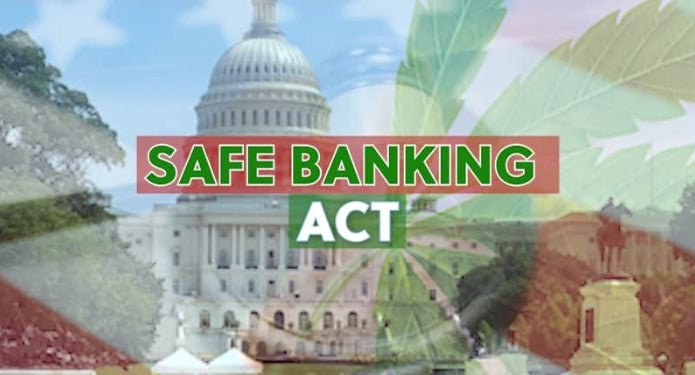With key Senate leaders meeting over the August recess to discuss the measure, both sides of the aisle feel confident the bill will finally be approved this session.

Financial security and physical safety for cannabis companies and their employees took a significant step forward during the recent congressional break. As first reported by Marijuana Moment, Senators from both parties met over the August hiatus to discuss the SAFE (Secure and Fair Enforcement) Banking Act.
The legislation that would allow cannabis businesses to have access to banking services, including loans, came close to passing in the Senate during last year's legislative session. However, bipartisan bickering and posturing on the part of certain Republican Senators ultimately prevented the measure from heading to the Senate floor for a vote.
With cannabis still listed as a Schedule 1 narcotic under the Controlled Substances Act, making it illegal at the federal level, current rules make it a federal crime for banks and other financial institutions to provide services to marijuana businesses. As a result, even though close to 40 states legally allow cannabis products, banks face the significant threat of having their deposit insurance discontinued or limited and potential criminal prosecution if they allow cannabis companies access to their financial services.
Because many cannabis companies cannot access the most basic banking services, they must operate a heavy cash-based business model. This reality has led to a massive spike in robberies, money laundering, and organized crime activity. The SAFE Banking Act will protect human beings and taxpayer dollars against the dark and seedy consequences of the ever-present marijuana black market.
Rep. Earl Blumenauer, D-Ore, Founder and Co-Chair of the Congressional Cannabis Caucus, expressed that sentiment by saying, "This legislation will save lives and livelihoods. It is past time that Congress addresses the irrational, unfair, and unsafe prohibition of basic banking services to state-legal cannabis businesses."
"This legislation will save lives and livelihoods. It is past time that Congress addresses the irrational, unfair, and unsafe prohibition of basic banking services to state-legal cannabis businesses."
- Rep. Earl Blumenauer, D-Ore
The bill's current version, which has received several tweaks throughout its legislative history, has enjoyed substantial bipartisan support over the years. Yet, because marijuana is still banned at the federal level, a small minority of staunchly conservative GOP lawmakers refuse to compromise and enable the bill to pass.
However, according to one Republican Senator, that may change soon. During the August break, bipartisan leaders met to discuss a realistic path for finally getting the much anticipated and desperately needed legislation across the finish line. The meetings among key Senators were described as "very productive" over the August recess by the lead GOP sponsor of the bill, Sen. Steve Daines (R-MT).
Likewise, Senate Majority Leader Chuck Schumer (D-NY) and Senate Banking Committee Chairman Sherrod Brown (D-OH) have also expressed a cautious but optimistic sentiment that the measure could head to the Senate floor for a vote soon now that Congress has reconvened.
According to Politico, Brown said, "We think there is an agreement imminent that there'll be general agreement on. We know that some members of the committee are going to vote no regardless, but we think there'll be something good that gets a good majority."
"We think there is an agreement imminent that there'll be general agreement on. We know that some members of the committee are going to vote no regardless, but we think there'll be something good that gets a good majority."
- Senate Banking Committee Chairman Sherrod Brown (D-OH)
While belief and expectations are high, the likelihood of the measure passing is contingent on several factors, with the most important being the must-pass legislation to fund the government, which will most likely consume a considerable amount of the Senate's time over the coming weeks.
Along with the government funding bill, there's also the issue concerning Section 10 of the legislation, which caused significant disagreement among Senators, preventing the measure from moving forward during the summer session.
Some Democrats believe the section would undermine banking regulations and want it amended or removed. Senators on the other side of the aisle see that option as a "non-starter." Moreover, neither party has indicated that a compromise could be reached on that issue during the break, which could allow the bill to move through the Senate Banking Committee and to the floor for a vote.
Having passed seven times in the House previously, the bill seemed to always stall out in the Senate. However, with the recent groundbreaking recommendation by the Department of Health and Human Services (HHS) to move cannabis from Schedule I to Schedule III of the Controlled Substances Act, there is substantial momentum, both politically and economically, to get much-needed logistical legislation like the SAFE Banking Act passed.
Currently, the measure has 42 cosponsors, including eight Republicans and three Independents. As a result, political insiders believe the bill's current version as a standalone piece of legislation already has enough Republican support to eclipse the 60-vote threshold necessary to approve passage in the Senate.
However, marijuana advocates and stakeholders have been here before. Since the initial bill's introduction more than a decade ago, industry leaders and supporters have ardently lobbied Congress to pass the legislation so that the legal and regulated adult-use cannabis market can access all of the financial tools and protections every other industry in America enjoys.
And while there is hope that this time will be the charm, many cannabis industry activists will believe it when they actually see it pass and signed into law by President Biden. Until then, they will continue to lobby, implore and encourage Senators to do their job and pass this critically needed legislation.








































